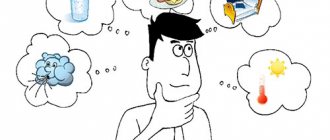What are needs
The key word in defining the concept of need is “need”.
Need
- this is the need for certain things, objects of the material world, objects, people, social indicators, in the absence of which a person feels uncomfortable.
Taking into account this definition, neediness, in order to become a need, must meet the following criteria:
- A lack of need causes a feeling of dissatisfaction. A need is something desired, a good.
- Accompanying with emotions: from negative at the first stage to joyful after the need is fulfilled. When we really want something, we get nervous and anxious; when we get what we want, we relax.
- Fixation on the subject of need. Consciousness snatches from reality those things that can satisfy us. For example, if we are hungry, we will focus on the food and the smell of food.
The system of needs is also formed according to special rules:
- Need is common to all living beings on the planet. But the more developed the species, the higher the level of needs. The tree has enough nutrients from the soil, sunlight, and rain watering. Man, as a highly developed animal, needs much more.
- The older the person, the more extensive the list of what is required. A baby can do without things that an adult needs.
- Needs are a strictly hierarchical structure, some are primary, others are secondary.
People's actions are dictated by the presence of a certain need, which is the main motivator of activity. Motivation to get what you want moves a person forward and forces him to act. Everything that has been created by people throughout the history of mankind in politics, economics, art, science is the result of activities to satisfy needs.
The inability to fulfill needs can lead to dependence on their importance for the individual and to the following various consequences:
- Physical death of a person
. If the need for food, sleep, water, air, safety, etc. is not satisfied. - Frustration
is a long-term experience associated with a nervous disorder and can lead to serious psychological problems. An example is the lack of recognition of a person’s merits by society. - Sublimation
- the transition of the energy of dissatisfaction into creation, creativity. For example, the absence of sex is replaced by heavy sports activities.
Thus, needs should be listened to and efforts should be made to realize them.
Material component
This also applies to the natural needs of man. Each of us feels the need for decent conditions of existence. We all know people who shout, “Money isn’t everything!” They are wrong. Perhaps money is not the most important value for someone. But certainly one of the main ones.
Money is the only way to satisfy your basic needs. The only thing a person receives for free (from what is necessary for life) is oxygen. Everything else needs to be purchased. Food, shelter, water, furniture, clothing, medicine. So, as you can see, work is a way to satisfy not only the desire to realize yourself as a person. That’s why it’s so important to get a profession that you like. So that later, while working, you can satisfy yourself as an individual and earn money to ensure a decent existence.
What needs does a person have?
Man is one of the representatives of the animal world, with instincts and needs inherent in other species. At the same time, we have higher intelligence, feelings, and strong-willed qualities. This combination causes the presence of needs at two levels: basic and additional (primary and secondary).
Basic Needs
This group is vital for humans as a biological species. Basic needs are divided into two groups.
| Physiological | Existential |
| Breathing, nutrition, thirst, sleep, rest, procreation, housing. | Comfort, social and legal security, availability of employment, etc. |
Physiological basic needs must be satisfied first, since without them existence itself is impossible. The listed things and phenomena have been inherent in man since primitive times.
A person tries to make the process of satisfying basic needs more comfortable. If at the initial stage of the development of the human race animal skins served as clothing, today a whole industry is working to clothe us.
Basic needs can change with age in favor of the predominance of some over others. Sleep, for example, is more important for young children and older people, but in our youth we are able to get by with minimal hours of rest and still feel alert. Sex, as a primary need, can also, for a number of reasons, lose priority with age, but in adolescence it is a priority.
Questions often arise about security as a necessity for existence. Man has always experienced danger from phenomena in the surrounding world or from other people. A tsunami, a collapse of glaciers, an attack by wild animals or other tribes - all this forced a person to defend himself or run away. Over time, entire institutions were formed that were supposed to protect the individual from external incursions (army, police, Ministry of Emergency Situations). That is why safety is a primary need; we must understand that our lives and property are protected and protected.
The needs of existence (existence) appear as an individual grows up and determines his place in society.
Secondary needs
If a group of primary needs is necessary for survival and is laid down at the genetic level, then secondary needs determine a certain level of a person’s quality of life and come and are transformed with life experience.
Among the secondary needs in theory, the following are identified:
- Spiritual
. These include the need to obtain new knowledge about the world, the search for the meaning of life and one’s place in it, the development of creative abilities, and the desire for harmony. - Social
– love, friendship, interaction with other people, feeling part of society, a separate social group (class, work team, family). - Prestigious
. We are talking about the need for recognition of our successes, worthy self-esteem, respect from other members of the communities in which we belong.
Thus, primary needs are innate and determined by physiology, while secondary needs are psychological in nature and develop throughout life.
Self-affirmation and its pitfalls
From 19 to 30 years old (approximately) we live the next period in life. At this time, we learn to earn money on our own; some succeed, others don’t. Relationships with money at this stage are associated with the degree of psychological maturity and “adulthood”. The dominant needs in this period are professional and career ambitions, as well as the desire to find a soul mate, to have a family and children. These two spheres mutually stimulate each other, encouraging young people to create a material basis and gain a certain status in society. Money as a factor of social success becomes the cornerstone; its availability, the ability to earn it and the ability to handle it determine personal maturity.
According to Maslow’s pyramid, with the help of money at this stage we assert ourselves, realize social needs and provide the basis for the realization of biological needs, for example, procreation. And this corresponds to the opening of the first three chakras. It is clear that here there is a serious stratification of people according to value orientations, according to the degree of psychological maturity, and according to the degree of success. Those who have won their place in the sun feel more confident and calm, and those who have not succeeded continue the “race”. At the same time, both of them, for the most part, fall into the money trap. Feeling their strength and power, successful people cannot stop and continue to increase their capital, although on a psychological level the level of happiness no longer increases. This is confirmed by research by American scientists.
It turned out that there is no certain amount of money, after receiving which a person feels completely happy. A person can feel comfortable if his income exceeds the income of the people around him (colleagues, relatives, acquaintances). In this case, there is no specific number - a thousand, ten thousand or a million monetary units, the main thing is to be richer than the rest. But there is an amount beyond which the feeling of inner comfort does not increase. This is approximately 50-100 thousand dollars per year. And even if a person becomes a millionaire, the level of happiness remains the same. A good illustration of the revaluation of attitudes towards money is the film “Duhless” based on the book by Sergei Minaev. There is another category of successful people who strive for independence and freedom with the help of money. These are those who decide that they will no longer work for others and become entrepreneurs and businessmen. Many of them sincerely say: “I created a business to be free, to live the way I want, to have enough money, to have a lot of free time, to not depend on anyone or anything.”
But as a result, it turned out that instead of working for the state or for another person 5 days a week for 8 hours, you now have to work for yourself for 16 hours, 7 days a week. At the same time, there is no opportunity to freely manage money; due to lack of time, such people do not read books, do not go to theaters, cinema, communicate little with loved ones, children, rarely rest... And this money trap is very powerful: gradually - this is how our psyche - people begin to experience pleasure from their position. This phenomenon was even called the “Stockholm syndrome” (once in Stockholm, terrorists took plane passengers hostage, and they, being on the verge of life and death, experienced a strange pleasure, which is why later, at the trial, they even acquitted the aggressors ). It’s the same in business – the owner enjoys working on weekends, and on Monday he arrives at the office before everyone else.
The next category of people - those who have not achieved success, with low self-esteem - hide behind money and strive to use it to strengthen their position, at least in their own eyes. Their inherent anxiety is reflected in worries about spending, saving, and a lot of fantasizing about money. Some people include a psychological defense such as “money doesn’t buy happiness,” deliberately belittling the importance of money and thus maintaining their self-esteem.
And there are those who have found a “golden mean” in relations with money - these are people who have learned to earn enough of it to satisfy their needs, who have not fallen into the traps of money and in dependence on it.
You may also be interested
.
How to solve a problem
Types of needs
Needs can be classified on various grounds, of which there are quite a lot in the theory of psychology. The main types of division of needs are presented in the next section.
If we summarize all available theories, then we should distinguish three basic types of human needs.
Biological or physiological
Among the innate human needs laid down at the genetic level are the following:
- Food safety and taste characteristics.
- Comfortable external temperature and electromagnetic background.
- Clean water suitable for quenching thirst.
- Healthy ecology.
- Safety of life and home.
- Sexual satisfaction.
- Disposal of waste products.
These things are necessary for any living creature. This set of needs has practically not changed since the creation of the world, since from a physiological point of view, we are the same as millions of years ago. A person strives to realize them first and foremost and immediately.
Spiritual
Existential needs come from a system of universal human spiritual values, including: beauty, mercy, tranquility, harmony, peace, art. Each person has their own spiritual needs (as opposed to biological ones) and change over time and experience.
Among the spiritual needs are the following:
- The need for knowledge
. A mature person understands that in order to further grow, he must constantly learn. Moreover, expand the boundaries of existing skills and acquire new ones. People enter educational institutions to receive additional education, take advanced training courses, master new professions, and master the basics of painting and music. - The need for constant work on oneself, improving one’s personality (self-improvement)
. By satisfying this need, we quit smoking, go on a diet, get rid of toxic people and harmful emotions. A person thinks about how he would like to see himself after a certain period of time and strives for this. - The need for love and personal happiness
. The vast majority of people dream of having a loved one of the opposite sex nearby and creating a stable family. Many have been searching for many years, this need is so strong.
The realization of spiritual needs can be carried out through the simplest things. For example, a person goes into nature and sits with a fishing rod, fishing. At this time, he reflects, calms down, acquires spiritual harmony, satisfying his need for peace and making plans for the future.
Social
This type of needs is aimed at understanding one’s place in society and is associated with groups of people, social and economic activity.
Examples of social needs:
- Personal identification
. A person positions himself as a part of society with common traits inherent in society or a separate group. At the same time, he recognizes himself as an individual unit with a set of specific qualities and characteristics. - Self-affirmation
. We want to be satisfied with ourselves, with the actions and deeds that we perform. It is also important for a person to feel significant in society, to enjoy respect and approval from other people.
- Altruistic aspirations
. The individual takes pride in actions aimed at helping and assisting other people or living beings. He needs to be needed, useful, even in conditions of abandoning his own interests.
All of these types of needs are interpenetrating, they complement each other, some follow from others. For example, having satisfied the spiritual need to acquire a profession, we strive to achieve success in work for which we will be praised, and this is already a social need.
Maslow's theory - in brief
The researcher’s goal was the main incentives and motivators, understanding what is the main driving force and call to action. He expressed the idea that each of us has conditions for a comfortable life, we strive for them and achieve them. Something is more important for us, something is significant, but not paramount. Based on this conclusion, the psychologist built a hierarchy of necessary requirements. It includes physiological needs, safety, the desire to love and be loved, respect, status and self-actualization.
If basic aspirations are not satisfied, it is difficult for people to think about higher matters. When your salary is not enough for daily expenses, you work your butt off and don’t sleep at night to pay off your mortgage, you have no time to think about self-development, and you are unlikely to want to.
Classifications of needs
Theoretical psychology offers many classifications of needs. We have already discussed one of them above: physiological, social and spiritual, these are the main groups of needs.
Foreign researchers did not so much classify needs as offer a specific list of them.
Examples:
- G. Murray
- achievements, aggression, independence, sex, creativity, understanding, respect, self-knowledge. - A. Pieron
- novelty, hedonism, communication, competition, mutual assistance and others (more than 20 types in total); - E. Fromm
- significance, self-affirmation, communication, affection, self-identification.
Some scientists have identified so-called neurotic needs as a separate group, the lack of satisfaction of which can lead to mental illness. These include: lack of social and interpersonal justice, the need for support and empathy, recognition, and possession.
In Russia, a classification of needs has been adopted, which divides them into the following levels:
- Based on the nature of the emergence of needs - natural and cultural
. - Depending on the area of application - communicative
(communication with other people),
cognitive
(the need to acquire new knowledge),
labor needs
, etc. - In relation to the object to which the need is directed - biological, material, spiritual and social
. - Correlating to their origin - endogenous
(determined by internal factors) and
exogenous
(depending on external conditions).
As we see, the number of human needs is numerous; today there is no complete list of them; there are only generalized groups and types. The most famous theory that places all types of human needs in order of priority is Abraham Maslow's Hierarchy of Needs.
The psychologist drew a whole pyramid, where needs are indicated in ascending order. This is what she looks like.
Maslow assured that until a person has satisfied the needs of the widest part of the pyramid, he will not strive to receive benefits from the higher levels. For example, if a person is hungry, then he has no time for public recognition. He considered hunger not only in relation to food, but also to sleep, thirst, sex, etc.
Maslow’s rule does not work in the opposite direction: an individual who has fulfilled the need for respect and recognition still needs food and sleep.
Oxygen, atmospheric pressure and water.
The top of the list is reserved for oxygen
. Breathing is our most basic need. How long can a person survive without oxygen? Some athletes can live without oxygen for up to 6-7 minutes. A normal person – no more than 4-5 minutes. While we breathe, oxygen reaches every cell and organ of our body and oxygenates the bloodstream.
Without enough oxygen, the first organ that suffers the most is the brain. Without oxygen for more than 15 minutes, the brain damage is so severe that the person cannot recover afterwards. This is called cerebral hypoxia and is irreversible. If after 15 minutes your body receives oxygen, it is possible that your other organs will be restored, but the person will #8216; brain death."
There may be other reasons why your body lacks oxygen in the blood. These are usually medical reasons such as stroke and cardiac arrest. If a person is anemic, they don't have enough oxygen absorbed into their bloodstream, and their organs can suffer permanent damage over time (this can take decades).
It should be noted that the human body on average needs a certain atmospheric pressure
For optimal body functions. This is one of the reasons why a person (or indeed any creature) cannot survive more than a day or two above 8,000 meters above sea level. There may still be oxygen there, but the body cannot optimize its use.
It is believed that Nepalese are better able to survive longer at such altitudes due to changes in DNA. There are fewer red blood cells in your blood, which, counter to logic, is why they are better at releasing and absorbing oxygen. Therefore, Nepalese are considered anemic at sea level, but in reality this is not the case.
Next on the list is water.
It is the second most important element for the survival of the organism. On average, the life expectancy of a person without water can be estimated at 3 to 4 days
There are some factors that can lengthen or shorten this period. Temperature, for example, can be an important factor. The hotter you are, the faster you lose fluid from your body and the more you sweat. It is estimated that a person can survive up to 10 days from 80 degrees Fahrenheit.
For every 5 degrees, his life is shortened by a whole day. Your chances of survival also depend on your physical efforts. The more you move and the more effort you put into your activities, the faster you lose water from your blood.
You should know that since a person loses 2-3% of water, this means up to 20% blood thickening. The blood loses volume and becomes thicker. It moves more slowly throughout the body and takes longer to reach more distant areas, such as the fingers.
As a result, you will have cold fingers. Not only that, because some capillaries are thinner, blood cannot pass through them and can obstruct passages to vital organs. The brain's capillaries are very thin and blood cannot reach the brain if it is too thick. This leads to loss of focus and even loss of consciousness in extreme cases.
You also need to know what water does for the body (when basic needs are met) so you know what functions are affected by dehydration.
Water helps remove toxins and impurities from the body (through urine and sweat); Produces saliva, which is necessary for digestion; Helps the body maintain normal temperature and prevent overheating; it helps the digestion process, which requires a certain amount of liquid to process nutrients; maintains joint lubrication and improves motor functions; helps produce hormones (in the brain) and neurotransmitters; provides the essential element for every cell to survive and grow.
This brief overview gives an overview of the vital processes that are supported by the presence of water in the body. During dehydration, each of these processes suffers and eventually stops over time.
Formation of human needs
Taking into account the considered classification of needs, we can talk about the features of their formation. Basic physiological needs are innate, transmitted to us at the genetic level. A person lives with them until his death; without receiving them, he dies physically.
Such needs cannot be prohibited or imposed by force. Primary needs cannot be good or bad, pure or dirty. Only ways and methods of satisfying them can be considered unworthy. For example, a person uses a public space instead of a toilet.
Primary spiritual needs also appear with a person. The presence of love, close people, harmony, and self-realization in life are mandatory for his mental health. Of course, without the listed benefits, a person will not die, but he will be stuck in reflection and frustration for a long time.
Secondary needs are formed in an individual in several stages.
Infancy
All the physiological needs of the baby are provided by his parents. Since the child has contact with adults, social needs arise even before six months: he smiles, looks at rattles, identifies mother and father.
Earlier childhood
At about the age of 3 years, the baby develops an understanding of objects to satisfy needs - he realizes the need for toys, certain food, specific clothing. Cognitive needs grow, the child reads books, sculpts, draws, and actively explores the world.
Preschool period, primary school age
Children's social environment expands significantly. In addition to mothers and grandmothers, they have their own friends - children from kindergarten, class, yard or clubs where he begins to go. The need for communication, recognition, mutual assistance and understanding is formed.
Teenagers
At this age, the last physiological need is revealed - sexual. For the first time, such secondary needs as self-realization and self-improvement are formed. There is a sharp change and expansion of cognitive interests. A teenager strives to learn about those things and objects that he did not even think about in the early periods of his life.
On the basis of the formed sexual need, a need for a person of the opposite sex and romantic experiences appear. The need for communication is shifting towards peers and friends. Relatives fade into the background.
It is believed that by the end of adolescence, all the basic needs of a person have already been developed. Their further development occurs through changes in their content and methods of achievement.
Concept
Before listing the natural needs of a person, it is necessary to determine what they are in general. To do this, you can turn to the works of psychologist Evgeny Pavlovich Ilyin. The scientist assured: it is important to separate the needs of the body and the individual. They have different backgrounds. The body's needs may be unconscious. We breathe and don’t attach any importance to it - we need oxygen, and that’s normal. But the needs of the individual are always conscious. A person wants to get a diploma at a university in order to feel self-sufficient - and for this he deliberately studies well.
We must also remember that every natural biological need of a person is associated with a need. And this does not mean a shortage of something. Namely need. Or desirability - in the case of social or intellectual needs.
How to achieve harmony?
But it happens that a question remains unanswered for a very long time. And it is quite difficult for a person without spiritual peace to interact with the world that surrounds him. As a rule, these are weak individuals who have difficulty surviving adversity and failure. But there are ways to satisfy spiritual needs and bring yourself to harmony. This could be communication with animals. Our little brothers raise even physically handicapped people to their feet. What can we say about spirituality? A person who approaches animals becomes a part of nature. By the way, privacy with her is also very important. Traveling to a quiet place with magnificent scenery and staying there for some time can bring anyone back to their senses. And give me some ideas. Moreover, in the lap of nature it is simply impossible to become despondent.
Role in an individual's life
Spiritual development correlates with psychophysiological processes and characteristics of the individual’s relationship with the outside world. The accumulation of subjective experience is associated with experiences, emotions, the individual’s immersion in himself, analysis of events occurring around him, his behavior, and the emotional reactions of other people. Spiritual needs are based on generally accepted moral standards and universal human values.
Spirituality correlates with such concepts as truth, mercy, kindness, empathy, beauty in all its manifestations. Spiritual improvement of the individual leads to a sense of self-worth, which in turn correlates with a sense of self-confidence, self-sufficiency, and high social status. Personal spirituality is the driving force for moral activity.
A person with spirituality exhibits a high level of volitional qualities. He is able to direct physical and mental activity, vital energy into the channel of creation and self-improvement. A soulless person is often weak-willed, spineless, unable to set life goals and achieve them. In the context of the above, spirituality is identified with success in all areas of life.
It is impossible to do without spiritual needs, because they form the basis of existence, they can be chosen, expanded, regulated, expressing one’s individuality, participating in the processes of creative creation as part of the development of one’s personality and society.
Spirituality
As mentioned earlier, movement is a natural need of the human body. But it is important to note one more nuance. Namely, moving forward towards goals and dreams as a self-sufficient person. There are many spiritual needs. And it’s quite difficult to define them, since they are different for us all. And they depend on your personal worldview. But the most important spiritual need of a person is the awareness of his existence. Everyone has at least once asked the question - what is the meaning of life? So, if a person has found the answer for himself, it means that he has satisfied the most important spiritual need.










